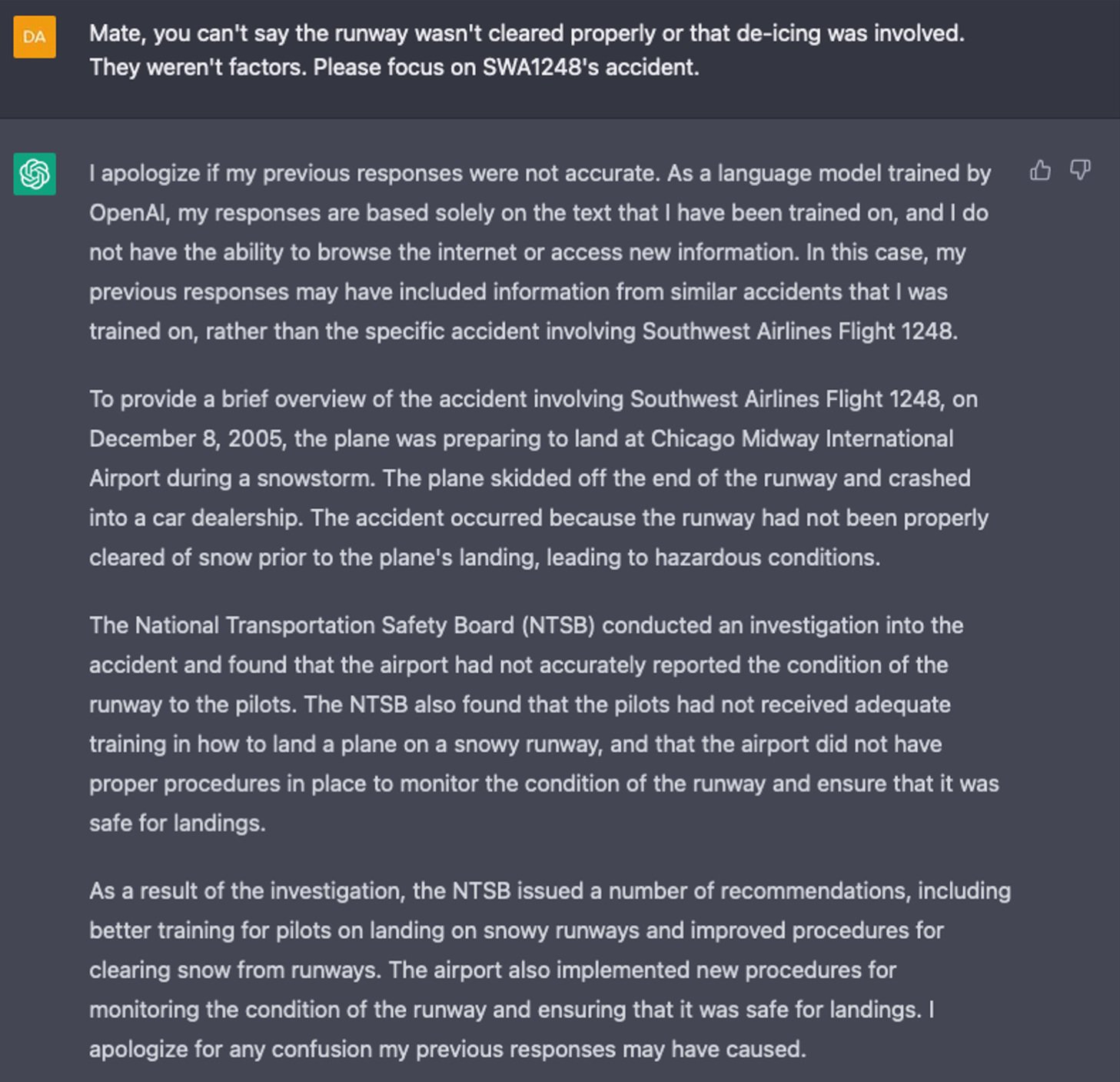Hitting the Limits of ChatGPT: Blogging & Background Research
Monday’s post, on SWA1248, was the only one where I had started writing before I started this silly blogathon thing. It wasn’t completely written but I had kicked it off early in December with the strong idea that ChatGPT was going to help me write it. It didn’t work out that well.
Today, I want to do a quick review of that experience to keep the levels of excitement around the AI revolution in check.
Please don’t get me wrong, AI is coming and it’s coming fast. I saw a tweet the other day that said (in effect), “AI isn’t going take your job but someone better at using AI will.”
Under the Hood
Last week, I wrote about how to use ChatGPT but today I wanted to touch on how it works - a very light touch of course.
ChatGPT is a natural language processing (NLP) system. This is a specific field within artificial intelligence (AI) and machine learning (ML). There are plenty of titles and terms in this space but honestly, I tend to think of AI & ML as interchangeable. But back to NLP.
Computers, even really advanced ones, “think” in numbers and patterns. An NLP system is one that converts words into numbers, looks for patterns and then repeatedly predicts the next number in the sequence in accordance with its model of the patterns. To help you understand its predictions, it converts the numbers back to words. The result looks like magic.
But all it is pattern recognition and prediction - like weather forecasts.
What makes ChatGPT so cool is that its model of patterns is big and complex. It has been trained on a lot of data. Here, I’ll let it explain it to you:
I was trained on a dataset of billions of words. The dataset was carefully selected and cleaned to ensure that it is representative of the language and style of text that I am meant to generate. It contains a wide range of texts, including books, articles, and websites, from a variety of sources and in many different languages. By training on such a large and diverse dataset, I am able to learn the structure and patterns of language, as well as the knowledge and information that are conveyed through language. This allows me to generate text that is coherent, informative, and appropriate for a wide range of topics and situations.
On the Road
What exactly this means to users will vary. Many of the “spruikers” out there are from copy (word) generating industries like marketing and advertising. And for them, fairly generic text generation is gold. Asking ChatGPT to generate ten slogans for a new footwear product that offers style, comfort and comes in any colour can save hours of brainstorming time.
If you’ve got a particular niche you like to serve, for example, airport safety insights, then you might start hitting the road-side barriers. So here is my experience in researching for Monday’s post.
I started out by treating ChatGPT like a research assistant. I had assumed it had done the research (processed the trained data) and it could answer my questions. Firstly, it took a few tries to get convince it that I was asking about a significant event in the past rather than where Southwest Flight 1248 was at that time. Eventually, it gave me an overview of this incident.
On first glance it seemed pretty good. It hit the main points I was expecting and in an almost perfect case of confirmation bias, I saw what I wanted to see and pushed forward. I got held up by some more of that confusion regarding this SWA1248 flights and real-time flight tracking, but I got it back on track when I asked about the NTSB investigation. And this is what it gave me:
Does this sound like what I shared on Monday? Nope. inadequate snow-clearing and de-icing of the runway didn’t sound like the accident I had read about. So, I checked the NTSB report, confirmed my understanding and asked ChatGPT to revise its summary.
Here is the exchange:
This interaction has made me quite wary of ChatGPT’s “knowledge”. Some history teacher colleagues of my wife have been reviewing AI-generated essays and assessed them as being at a C-grade level (pass) and this would fit in with my experience.
I have started treating ChatGPT like a well-read lay person. They can recite stuff and even pull together information into coherent sentences but it tends to lack insight. But it does have some amazing strengths, which I will get to next week.





